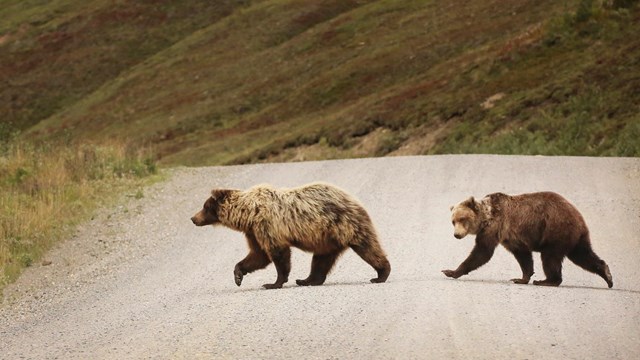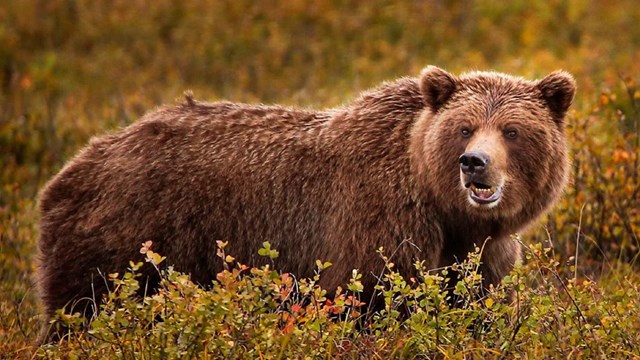
NPS Photo / Jane Gamble
Help Bears Where You Live
Bears aren't restricted to living in parks — their home range can span a few square miles up to several hundred! As they move, they cross park boundaries into neighboring lands and gateway communities. While seeing a bear in your backyard may be a thrilling experience, private homes are no place for wild animals. Bears on private property can cause damage and become dangerous not only to you, but also to the bear itself. Please do your part to keep bears wild by following these general guidelines.
For more information about the types of bears in your area and state regulations regarding wildlife, contact your local national park or state department of wildlife.
Here are some ways to help:
Be bear aware.
If you live in bear country, be alert to your surroundings. During active periods, bears may roam onto your property.

NPS Photo / K. Jalone
Do not feed bears.
Bears are quick learners and when people feed them they begin to associate humans with food. Sadly, once bears actively associate humans with food, they can pose a safety threat and may need to be killed.
Keep garbage out of reach.
Store garbage containers indoors—in sheds or garages—in airtight containers or use bear-resistant trash containers. Garbage should be put outside the morning of collection and not the night before. Double bagging your trash can also help mask the odor that attracts bears.
Protect your fruit trees and gardens.
Pick fruit as it ripens; never leave fruits or vegetables to rot on the ground. If you have a compost pile, never leave fish, meat, or fruit scraps in your compost. Sprinkling compost with lime can aid the composting process and reduce odors that attract bears.

NPS
Store pet food properly.
Pet or livestock feed should be stored in a secure building or in bear-resistant containers. Feed your pets indoors.
Use bird feeders wisely.
Put bird feeders out only when bears are less active, such as winter or during the day. Clean up spilled bird seed. Remove bird feeders if bears have been seen in your area.
Clean and store barbecue grills.
Clean grills regularly after use and store them safely in a garage or shed. Never leave food cooking outside unattended; the smell can attract bears and you may lose your dinner.
Never approach a bear.
If a bear enters your yard, you may try to scare it away from a distance. Make loud noises by clapping your hands and yelling. If the bear is in your home, stay out of its way. Do not block the bear and make sure it has a clear route to leave. If the bear won’t leave, call your local division of wildlife. If the bear poses a threat to your safety, call 911.

We all have a role to play in helping to ensure the future of bears across the United States. You can do your part in parks by staying safe

Find out what else you can do to help conserve natural resources at home.
Last updated: June 8, 2023
